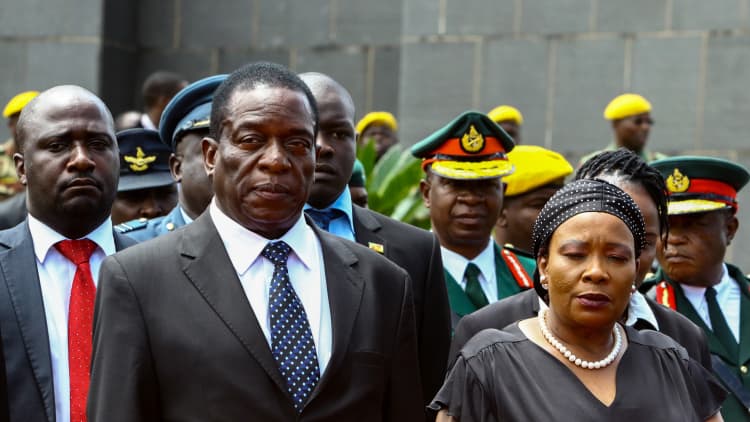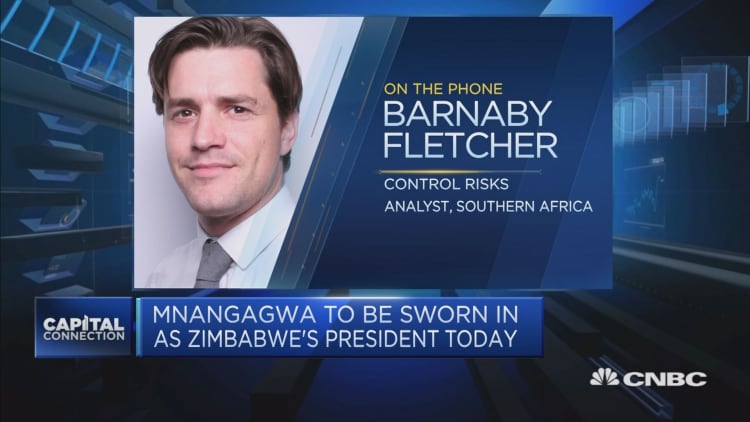Zimbabwean President Emmerson Mnangagwa said that less than half of the country's estimated $1.42 billion believed to be illegally kept abroad has been brought back onshore, as a 90-day amnesty period ended.
Mnangagwa announced shortly after his swearing in as president in November that the money was to be repatriated. On Monday, he said that only $591 million had returned to Zimbabwe, adding that the individuals and companies who had ignored the amnesty would be named, and he would "ensure that those responsible for such illicit financial flows are brought to justice," Reuters reported.
But despite the difficulty in repatriating cash, Zimbabwe's latest economic and political developments indicate renewal.
Mnangagwa announced on Saturday that former British colony is to hold presidential and parliamentary elections in July, the first since former President Robert Mugabe was forced to resign in November.

"We are looking forward to very peaceful, transparent and harmonized elections," he told reporters.
The move was welcomed by the United Nations, which, alongside the European Union and Japan, is helping facilitate the voter registration process. Mnangagwa has said that he would invite foreign observers to the vote. According to local press, European Union officials are in Zimbabwe's capital Harare Monday on an assessment mission ahead of the vote.
Zimbabwe and South Africa are 'joined at the hip'
Meanwhile, South Africa's new President Cyril Ramaphosa also visited neighboring Zimbabwe on Saturday. The meeting confirmed that the two countries are "joined at the hip" and will find "clever ways" of growing their economies, Ramaphosa was quoted as saying by South African media outlet News24.
"As the leader of the region's main power, Ramaphosa's endorsement carries significant symbolic weight," William Attwell, practice leader for sub-Saharan Africa at emerging market advisory firm Frontier Strategy Group, told CNBC Monday. He "paves the way for similar trips by other leaders, both from the region and from Western donors (who Mnangagwa is actively courting.)"
Question marks remain over the circumstances in which then-Vice President Mnangagwa assumed power in November last year, ending former President Robert Mugabe's nearly four decades-long rule. Mugabe himself, speaking on Thursday in his first televised comments since being ousted, described the process as a "coup d'etat."
Foreign investors are taking note of Zimbabwe's recent upheaval. "Investors are bullish on Zimbabwe's prospects going forward, attracted by the market's resource endowments, large urban middle class and skilled talent pool," Attwell said. "Senior executives from major local banks I spoke to say the upswing in inbound queries by prospective investors is the highest they've seen in many years."
However, foreign investors from close to home could prove to be the biggest boon for Zimbabwe.
"South African investors will play a critical role in any turnaround of Zimbabwe's economy, given the countries' close geographic proximity, long-standing business ties and historically amicable political relations," Charles Laurie, director and head of politics at consultancy Verisk Maplecroft, told CNBC Monday.

"Infrastructure links, close banking ties and established working relationships mean that South African businesses recognize their unique first-mover advantage over Western competitors in capitalizing on early entry into Zimbabwe," Laurie detailed.
A twinning of political events in Zimbabwe and South Africa has occurred in recent months, as Ramaphosa was appointed president of the latter country in February of this year, ending the nine-year rule of scandal-ridden former President Jacob Zuma.
"Both countries are now led by successful businessmen and not by political dinosaurs. If both leaders can build on early progress towards a more pragmatic business-focused policy agenda, the stage is set for a significant uptick in cross-border trade," Laurie said.

